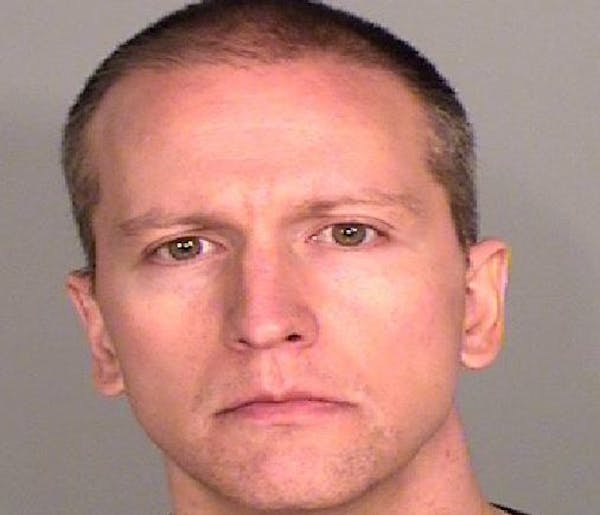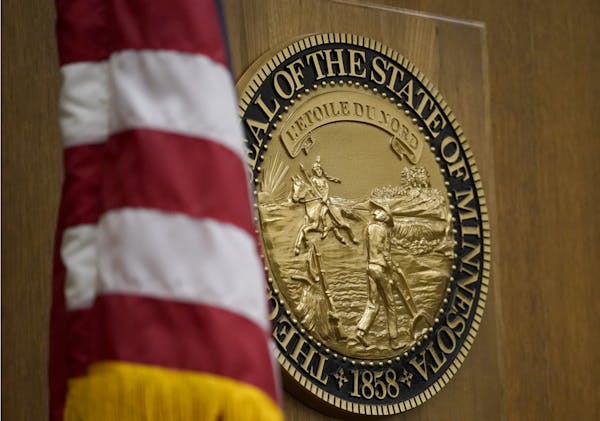A group of teenage boys used to call out to Chaunté Ford as she walked the halls of St. Louis Park Middle School in her police uniform.
"Here comes 12," they would mutter, a slang term for law enforcement. She would smile and try to approach them, but most times she was shunned, until one day the boys finally acknowledged her by name.
"I have had some kids who are like 'Nope. Cops are bad. I'm not going to associate myself with you,' " Ford said. "Sometimes that's a challenge. It's just about being consistent and showing them that you care and then eventually they come around."
Ford isn't a stranger to the slow process of building trust, but as a Black policewoman doing her job while a former officer is on trial in George Floyd's death, many of her challenges lately have been within herself.
"Once George was killed I was like, 'Am I part of the problem? Am I really fixing anything? Am I helping to make anything better?' " Ford said. "I questioned that and I didn't want to go to work that day. I was just like, this is too much."
Struggling to reconcile her profession and her cultural identity, she has both marched in peaceful protests and pushed for bias awareness at work.
"I am a Black woman, and I am a police officer," she said. "I do struggle with that."
Doubt and anxiety have plagued law enforcement departments in recent months. The Minneapolis Police Department had 200 fewer officers available to work at the beginning of this year than last, with unprecedented numbers leaving or filing disability claims amid the community outcry following Floyd's death. Many cited post-traumatic stress disorder.
Officers across the country are facing more ire than ever, said Betsy Smith, a police veteran and spokeswoman for the National Police Association.
"Derek Chauvin is one guy involved in one incident, and we are all being blamed for what he did," Smith said.
Out of nearly 11,000 licensed active peace officers in Minnesota, fewer than 250 are Black, according to estimates from the state chapter of the National Black Police Association, where Ford is secretary.
Ford, 32, is one of a handful of Black public safety personnel at the nearly 60-person St. Louis Park Police Department.
At her suggestion, the department has watched a series of videos about systemic racism. Since Floyd's death, Ford also started a monthly meeting with the other Black personnel in the department to provide a safe space to connect. With the Chauvin trial beginning, Ford anticipates they will meet more often. The group is also considering expanding to other suburban departments.
"It's very lonely," Ford said. "When you walk into a place and nobody looks like you and then when there's all of this tension and all of this stuff that's going on, it can be very isolating, and nobody should have to feel that way."
Being Black on a police force is not easy anywhere, officers say.
"It's still an issue dealing in the [Black] community," said Charles Wilson, national chairman of the National Association of Black Law Enforcement Officers. "Sometimes people look at us and say we are part of a problem instead of part of the solution. … The only way you are going to change what is going to happen in the job is you on the job."
Emotional reactions
When Ford learned of Floyd's death, she couldn't bring herself to watch the entire cellphone video of his struggle, she said: "I was so heartbroken, upset, disgusted, I mean so many different feelings."
Similar to how she felt after local officers killed two other Black men in separate incidents — Jamar Clark and Philando Castile — Floyd's death and the racial reckoning it inspired has made her feel like she is caught in the middle. Last summer, Ford decided to join a couple of marches to voice her frustration.
"I don't see why I couldn't go into a march," Ford said. "I'm not wearing a uniform. I'm just regular Chaunté. … I'm passionate about law enforcement and I'm passionate about creating equal rights. I shouldn't have to choose a side."
For the most part, she doesn't take the anti-police rhetoric at demonstrations personally, Ford said.
"I can feel where they're coming from," she said. "They're not talking about me as a human being. I feel like when people say stuff about the police, it's as a whole. The organization as a whole needs to change."
People should understand that police put themselves in danger to serve the community every day, she said.
"There are some times that I'm done with a call and I'm breathing hard and I have my hands on my knees," Ford said. "This job is dangerous to go into these people's houses. You don't know what they might have."
Ford had never thought about becoming an officer while growing up in Brooklyn Park. When she was 18 or 19 years old and working as a barista, a Black officer offered to take her on a ride-along. They pulled over a car.
"When we made that traffic stop, the officer let me decide if this person is going to get a ticket or not, and I think realizing how much impact officers have on people's lives I was like, 'Oh my gosh. This is so neat,' " Ford said.
She didn't give the person a ticket, and Ford decided to pursue a career in criminal justice. After she was hired as a community service officer in 2011, Ford was sworn in as the first Black female officer the St. Louis Park department the following year. For about four years, Ford, who is of mixed race, remained the only Black officer there.
'I hate that I'm a cop!'
In 2016, Ford's life as an officer came to a crashing low.
One August night, about a month after the police shooting of Castile, Ford was arrested for driving while intoxicated. Apologetic and tearful at first, according to a criminal complaint she later became belligerent, yelling expletives at officers: "I hate that I'm a cop! All you guys do is harass Black people!" She was convicted of third-degree DWI and put on administrative leave.
It was a dark time for Ford, who said she was supported in her turnaround by community members.
"We still have to hold people accountable. … I needed to be held accountable," said Ford, who said Castile's death and mounting stress as a Black officer played a part in her downward spiral and unhealthy coping habits.
A fresh start
After several years, Ford rebounded and recommitted herself to helping young people. Last year, she was put on special assignment at the middle school.
"Throughout Chaunté's career she has demonstrated a gift for developing lasting relationships with community members," St. Louis Park Police Chief Mike Harcey said.
Surrounded by posters and handmade drawings from students, Ford more resembles a school counselor than a cop.
Her small office is filled with bags of boxing gloves for the boxing lessons she gave students.
Ford would stop by the homes of students who weren't logging online for class when schools were closed for COVID-19. She volunteers with teens to help them develop positive relationships with police, sometimes sharing what to do if they have an encounter with an officer.
"Sometimes it will still pop up: 'Am I just part of the problem?' … But I know I'm doing the right thing. I know we have to be at the table in order to create change. I want my voice to be heard."
This story is part of a collaboration with "Frontline," the PBS series, through its Local Journalism Initiative, which is funded by the John S. and James L. Knight Foundation and the Corporation for Public Broadcasting.
nicole.norfleet@startribune.com 612-673-4495 • Twitter: @nicolenorfleet







